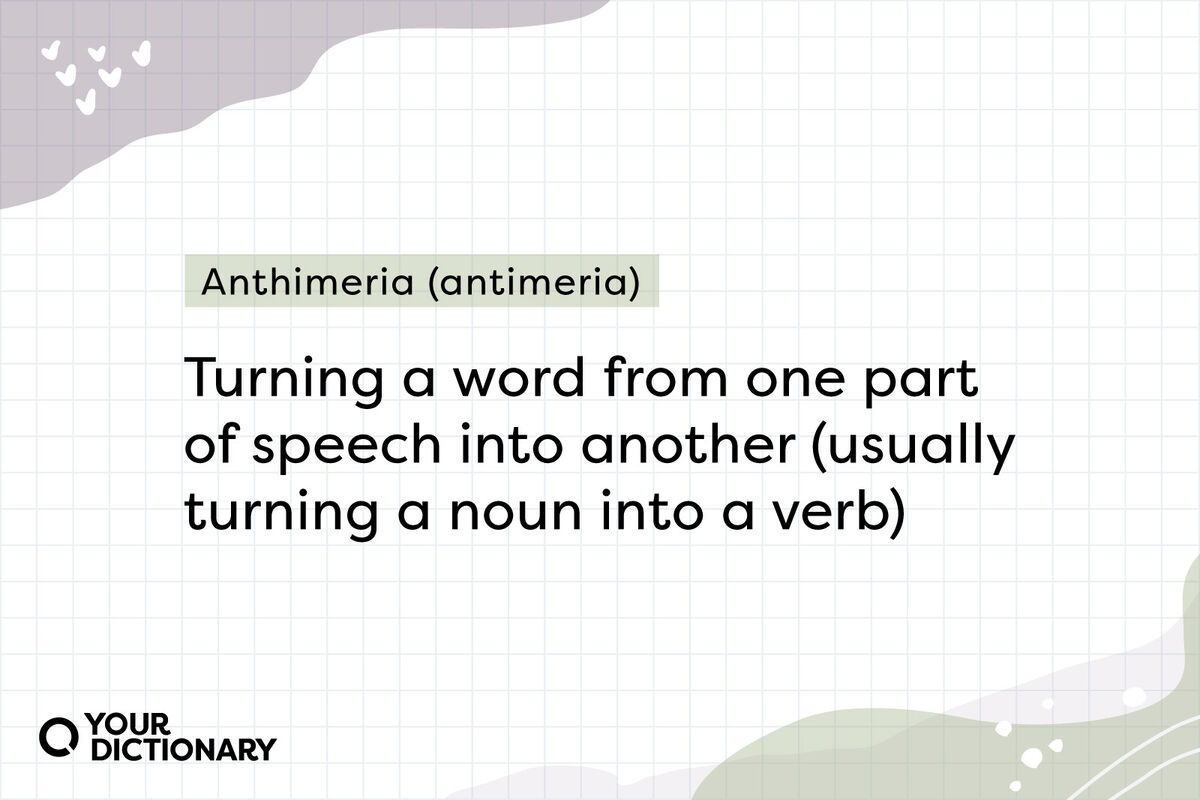
Language is constantly evolving, helping us describe all the strange complexities of life. Anthimeria is just one way that writers and society at large have changed language without necessarily inventing whole new words.
Defining Anthimeria
Anthimeria (or antimeria) involves turning a word from one part of speech into another. Most commonly, this involves turning a noun into a verb. Turning a noun into a verb is also known as “verbing” (which is itself an anthimeria).
The word anthimeria originates from the Ancient Greek anti- (meaning opposite) and -meros (meaning part). Combining those two roots gives the meaning “one part for another.”
Types of Anthimeria
Adding a little complexity to the situation, anthimeria come in two types that describe a word’s staying power.
Permanent Anthimeria
Permanent anthimeria are anthimeria that have entered wide usage enough to become permanent. For example, chill was initially a synonym for cold, but it has since become a verb to describe the process of making something cold or meaning "to relax." More modern examples of permanent anthimeria include:
- Text
- Type
- Sleep
- Cry
- Nerd
- Bookmark
Temporary Anthimeria
More frequently, anthimeria words are fads or trends that are unlikely to have longevity or widespread usage. These are known as temporary anthimeria and include:
- Adult
- Hashtag
- Troll
- Macgyver
- Venmo
- Zoom
Common Examples of Anthimeria
Anthimeria are so common in modern language that you probably don’t even realize you’re using them when you’re talking to your friends or texting Grandma.
Today, Google is a multi-billion dollar company that provides everything from smartphones to apps, but it’s still most well-known for its search engine. This has led to “Googling” as a general term for looking something up online.
Sleep
Sleep is largely used as a noun meant for catching your Z’s, but it is now commonly used as a verb as in “I had a good sleep.”
Sandwich
We know sandwiches as a food involving two pieces of bread and some sort of filling. “To sandwich” something also means pressing something between two objects.
Book
A book is a bunch of pages sandwiched between two covers. Book has also become a verb for making a reservation or appointment, as in booking a flight or hotel.
Blog
Blog was initially an abbreviation for weblog, which generally comprised daily logs or diaries but expanded to include articles and news sites. Blogging refers to the action of writing or recording in a blog.
Spam
Spam is a canned pork product introduced in 1937. Spam has since been used to refer to unsolicited and unwanted emails, texts or messages. The verb form of spam means “to repeatedly send the same message, often to a large audience.”
Shakespearean
The Bard himself invented many everyday words we use today, and many of his plays included anthimeria liberally. His influence on culture, literature and language has become so significant that we now have the word Shakespearean to describe things related to Shakespeare or that are reminiscent of his works.
Because
Because is a subordinating conjunction that connects two clauses where one explains the other. Thanks to the internet age, because has become more of a preposition, sometimes known as the “because-noun.” Because reasons.
Ghost
If spooky specters weren’t scary enough, you now have to worry about getting ghosted. Ghosting is when a person abruptly ends all communication with another person with no explanation.
Fail
To fail is a deeply human experience and hopefully leads to a learning moment and a better understanding of yourself. The noun form of fail (more often an epic fail) more often leads to memes.
Quotes That Contain Anthimeria
Even beyond everyday conversation, anthimeria are commonly used and even invented in works of art and culture, as well as advertising campaigns. That includes music legend Nancy Sinatra and some guy named Bill Shakespeare.
- “Yeah, you keep lyin’ when you oughta be truthin’/ And you keep losing when you oughta not bet/ You keep samin’ when you oughta be a changin’” - “These Boots Are Made for Walkin,” Nancy Sinatra
- “Up from my cabin, My sea-gown scarf'd about me, in the dark.” - Hamlet, William Shakespeare
- “When the rain came to wet me once, and the wind to make me chatter; when the thunder would not peace at my bidding…” - King Lear, William Shakespeare
- “Heavens! Let me not suppose that she dares go about, Emma Woodhouse-ing me!” - Emma, Jane Austen
- “Spread the Happy” - Nutella’s tagline/slogan
You Ever Noun a Verb?
Anthimeria is an incredible way to play with words, and it has contributed to some real shifts in the English language. The next time you consider all the parts of speech, realize that a noun today may become a verb tomorrow.